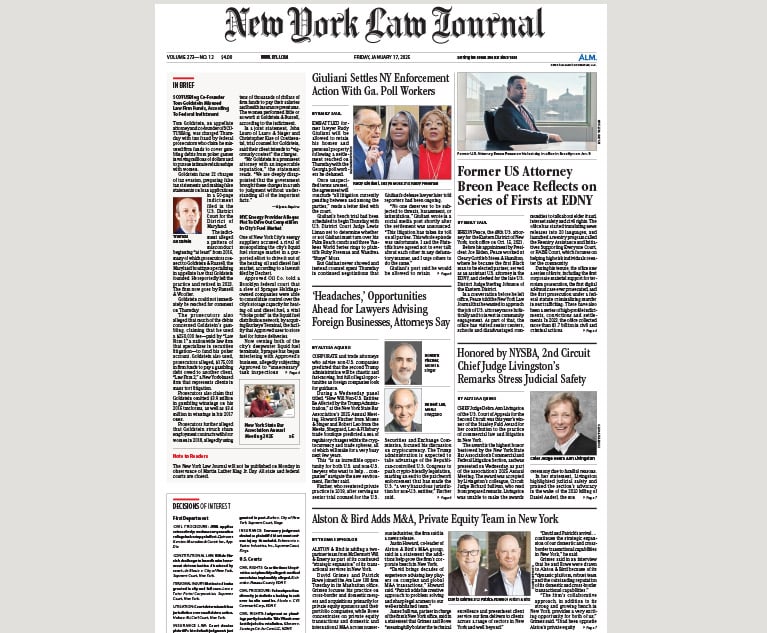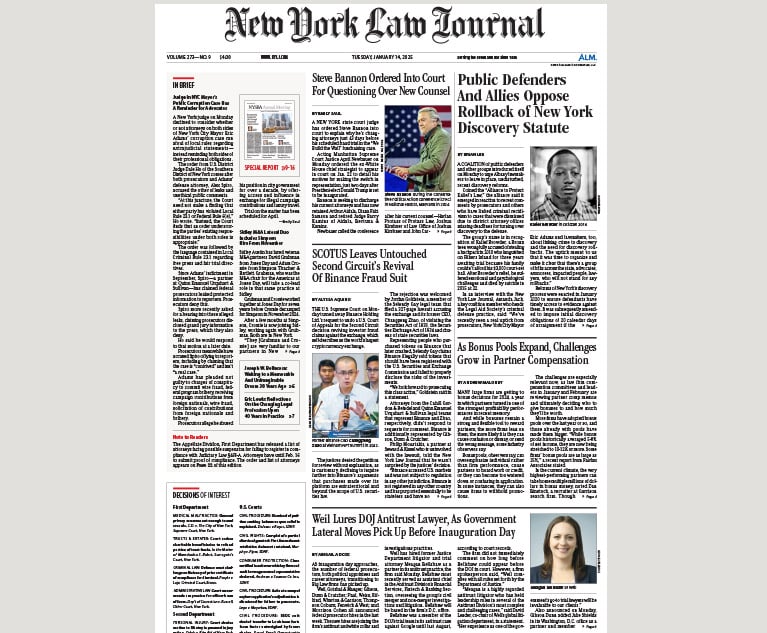Veteran In-House Counsel Talk About Why They Moved to Law Firms
Teri Wood of International Business Machines Corp. in New York recently joined Jackson Lewis, a labor and employment law firm, as of counsel.
February 13, 2019 at 01:53 PM
6 minute read
The original version of this story was published on Corporate Counsel
 Teri Wood, counsel, left, with Jackson Lewis and Dale Nelson, right, of Donaldson + Callif.
Teri Wood, counsel, left, with Jackson Lewis and Dale Nelson, right, of Donaldson + Callif.
Two veteran in-house counsel, Teri Wood of International Business Machines Corp. in New York and Dale Nelson of Warner Brothers Entertainment Inc. in California, recently left their respective companies to go into private practice.
Wood this month joined Jackson Lewis, a labor and employment law firm, as of counsel. Previously she spent 23 years at Armonk, New York-based IBM, primarily as associate general counsel overseeing global labor and employment matters. Prior to that she spent 15 years at American Express Co., where she was managing counsel in charge of employment law matters. She also spent about a year as an administrative law judge for the U.S. Equal Employment Opportunity Commission, and a year as an associate at Stroock & Stroock & Lavan.
On the West Coast, Nelson became a partner at Donaldson + Callif, a boutique law firm in Beverly Hills that specializes in representing independent producers of film, TV shows and web-based content. Prior to that, she worked over 20 years as vice president and senior intellectual property counsel at Warner Brothers. She began her career as a litigation associate with Los Angeles firm Lyon & Lyon.
Why did you want to leave a successful in-house counsel career to return to private practice?
Teri Wood: I love IBM and I had a full career there, but I was ready for the next act. I'd been thinking about it a long time and talking to my mentors. It was an analysis of what was right for me. And this to me made the most sense—joining a recognized leader in employment law.
Dale Nelson: For me it was a very personal decision to take an opportunity to start a new chapter in my career. I spent 20 very happy years at Warner Brothers, and I could have happily continued. But a new opportunity presented itself that I felt was unique, where I could apply my knowledge and expertise representing independent filmmakers at a time when there seems to be unprecedented interest in independent and documentary films, and I couldn't really resist the challenge.
Many times I come into contact with the creators, getting as close as a lawyer can get to the world of artists. Donaldson + Callif worked on more than 30 films being shown at this year's Sundance Film Festival, and two films that were nominated for Oscars in 2019. It is a really interesting place at a really interesting time.
How does your current work differ from what you did as in-house counsel?
TW: I said I loved IBM, with its amazing leaders who analyzed and then made big, bold decisions. It was fabulously exciting, and among other things, I worked internationally on the employment law piece of acquisitions and divestitures.
At Jackson Lewis, I'm focusing on areas that will be most helpful to the firm and mesh with my background—corporate governance, internal investigations, noncompete and unfair competition practices, plus some international work. Now I'm expanding my experience and making it available to a host of clients in different industries.
DN: From my perspective, it's about the legal issues, which are very similar. Both here and there the law practice is geared toward protecting the free speech rights of filmmakers to tell their stories.
Looking back, one thing I'm grateful for is that I was in a legal department that serviced all of the businesses of the studio and that gave me an opportunity to work with a lot of different business units and executives and projects. So coming here to a firm with a wide variety of clients doesn't feel that different.
What is the biggest adjustment you've had to make related to this move?
TW: When you're in a corporation, you are very focused on learning about your one client and its leaders. When you are at a law firm, it's learning about different businesses and industries, and their leaders. Yes, you draw from your own experiences, but you need to really think about the differences.
I find myself always saying “pause”—don't just fall back on preconceived ideas about how this business could operate. These are new people and new ideas, and you have to be open and understanding. You can't let loose of that.
DN: There is a change in terms of coming from a big company to a small law firm. Warner Brothers has a reputation for feeling like a family, which I will attest is absolutely true. But everyone here has been really warm and welcoming as well. So it's more like going from a big family to a small family.
What advice would you give to another in-house lawyer who may want to work for a law firm?
TW: First, I would draw on all your experiences with the many different law firms you've worked with during your in-house practice. Firm culture, climate and levels of expertise can vary widely. Jackson Lewis has excellent diversity and inclusion initiatives for women attorneys and attorneys of color, and that stood out to me. Choose a firm and culture that works for you best as a professional.
Next, map your practice strengths against those of the firm. Determine where you can add value to enhance the firm's practice. Also, remember a law firm is a business. Create a plan for business and marketing that you would bring to the firm. Last, spend sufficient time in discussions with the firm leadership before you settle on your firm and your next act.
DN: It's such a personal decision, that it's difficult to give general advice. Like any big decision in life, it helps to do your research, to learn as much as you can about the firm you are considering, to talk to people who have made that kind of a change, to think about your career goals, and to talk to all your friends and family so you can come to the right decision.
This content has been archived. It is available through our partners, LexisNexis® and Bloomberg Law.
To view this content, please continue to their sites.
Not a Lexis Subscriber?
Subscribe Now
Not a Bloomberg Law Subscriber?
Subscribe Now
NOT FOR REPRINT
© 2025 ALM Global, LLC, All Rights Reserved. Request academic re-use from www.copyright.com. All other uses, submit a request to [email protected]. For more information visit Asset & Logo Licensing.
You Might Like
View All

Alston & Bird Adds M&A, Private Equity Team From McDermott in New York
4 minute readTrending Stories
- 112-Partner Team 'Surprises' Atlanta Firm’s Leaders With Exit to Launch New Reed Smith Office
- 2Amex Latest Target as Regulators Scrutinize Whether Credit Card Issuers Deliver on Rewards Promises
- 3Vedder Price Shareholder Javier Lopez Appointed to Miami Planning, Zoning & Appeals Board
- 4Wells Fargo and Bank of America Agree to Pay Combined $60 Million to Settle SEC Probe
- 5Legaltech Rundown: Robin AI Releases In-house Tool, Epona Merges With JustiSolutions, and More
Who Got The Work
J. Brugh Lower of Gibbons has entered an appearance for industrial equipment supplier Devco Corporation in a pending trademark infringement lawsuit. The suit, accusing the defendant of selling knock-off Graco products, was filed Dec. 18 in New Jersey District Court by Rivkin Radler on behalf of Graco Inc. and Graco Minnesota. The case, assigned to U.S. District Judge Zahid N. Quraishi, is 3:24-cv-11294, Graco Inc. et al v. Devco Corporation.
Who Got The Work
Rebecca Maller-Stein and Kent A. Yalowitz of Arnold & Porter Kaye Scholer have entered their appearances for Hanaco Venture Capital and its executives, Lior Prosor and David Frankel, in a pending securities lawsuit. The action, filed on Dec. 24 in New York Southern District Court by Zell, Aron & Co. on behalf of Goldeneye Advisors, accuses the defendants of negligently and fraudulently managing the plaintiff's $1 million investment. The case, assigned to U.S. District Judge Vernon S. Broderick, is 1:24-cv-09918, Goldeneye Advisors, LLC v. Hanaco Venture Capital, Ltd. et al.
Who Got The Work
Attorneys from A&O Shearman has stepped in as defense counsel for Toronto-Dominion Bank and other defendants in a pending securities class action. The suit, filed Dec. 11 in New York Southern District Court by Bleichmar Fonti & Auld, accuses the defendants of concealing the bank's 'pervasive' deficiencies in regards to its compliance with the Bank Secrecy Act and the quality of its anti-money laundering controls. The case, assigned to U.S. District Judge Arun Subramanian, is 1:24-cv-09445, Gonzalez v. The Toronto-Dominion Bank et al.
Who Got The Work
Crown Castle International, a Pennsylvania company providing shared communications infrastructure, has turned to Luke D. Wolf of Gordon Rees Scully Mansukhani to fend off a pending breach-of-contract lawsuit. The court action, filed Nov. 25 in Michigan Eastern District Court by Hooper Hathaway PC on behalf of The Town Residences LLC, accuses Crown Castle of failing to transfer approximately $30,000 in utility payments from T-Mobile in breach of a roof-top lease and assignment agreement. The case, assigned to U.S. District Judge Susan K. Declercq, is 2:24-cv-13131, The Town Residences LLC v. T-Mobile US, Inc. et al.
Who Got The Work
Wilfred P. Coronato and Daniel M. Schwartz of McCarter & English have stepped in as defense counsel to Electrolux Home Products Inc. in a pending product liability lawsuit. The court action, filed Nov. 26 in New York Eastern District Court by Poulos Lopiccolo PC and Nagel Rice LLP on behalf of David Stern, alleges that the defendant's refrigerators’ drawers and shelving repeatedly break and fall apart within months after purchase. The case, assigned to U.S. District Judge Joan M. Azrack, is 2:24-cv-08204, Stern v. Electrolux Home Products, Inc.
Featured Firms
Law Offices of Gary Martin Hays & Associates, P.C.
(470) 294-1674
Law Offices of Mark E. Salomone
(857) 444-6468
Smith & Hassler
(713) 739-1250








